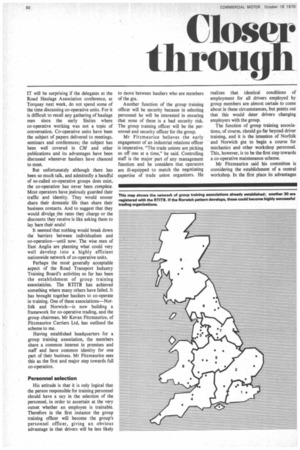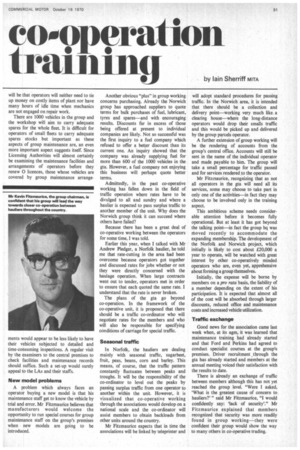Closer co.oprration through training
Page 52

Page 53

If you've noticed an error in this article please click here to report it so we can fix it.
by lain Sherriff MITA IT will be surprising if the delegates at the Road Haulage Association conference, at Torquay next week, do not spend some of the time discussing co-operative units. For it is difficult to recall any gathering of haulage men since the early Sixties where co-operative working was not a topic of conversation. Co-operative units have been the subject of papers delivered to meetings, seminars and conferences; the subject has been well covered in CM and other publications and its advantages have been discussed whenever hauliers have chanced to meet.
But unfortunately although there has been so much talk, and admittedly a handful of so-called co-operative groups does exist, the co-operation has never been complete. Most operators have jealously guarded their traffic and identity. They would sooner share their domestic life than share their business contacts. And to suggest that they would divulge the rates they charge or the discounts they receive is like asking them to lay bare their souls!
It seemed that nothing would break down the barriers between individualism and co-operation—until now. The wise men of East Anglia are planning what could very well develop into a highly efficient nationwide network of co-operative units.
Perhaps the most generally acceptable aspect of the Road Transport Industry Training Board's activities so far has been the establishment of group training associatitins. The RT1TB has achieved something where many others have failed. It has brought together hauliers to co-operate in training. One of these associations—Norfolk and Norwich—is now building a framework for co-operative trading, and the group chairman, Mr Kevan Fitzmaurice, of Fitzmaurice Carriers Ltd, has outlined the scheme to me.
Having established headquarters for a group training association, the members share a common interest in premises and staff and have common identity for one part of their business. Mr Fitzmaurice sees this as the first and major step towards full co-operation.
Personnel selection His attitude is that it is only logical that the person responsible for training personnel should have a say in the selection of the personnel, in order to ascertain at the very outset whether an employee is trainable. Therefore in the first instance the group training officer will become the group's personnel officer, giving an obvious advantage in that drivers will be less likely to move between hauliers who are members of the gta.
Another function of the group training officer will be security because in selecting personnel he will be interested in ensuring that none of them is a bad security risk. The group training officer will be the personnel and security officer for the group.
Mr Fitzmaurice believes the early engagement of an industrial relations officer is imperative. "The trade unions are picking us off one at a time," he said. Controlling staff is the major part of any management function and he considers that operators are ill-equipped to match the negotiating expertise of trade union organizers. He realizes that identical conditions of employment for all drivers employed by group members are almost certain to come about in these circumstances, but points out that this would deter drivers changing employers with the group.
The function of group training associations, of course, should go far beyond driver training, and it is the intention of Norfolk and Norwich gta to begin a course for mechanics and other workshop personnel. This, however, is to be the first step towards a co-operative maintenance scheme.
Mr Fitzmaurice said his committee is considering the establishment of a central workshop. In the first place its advantages will be that operators will neither need to tie up money on costly items of plant nor have many hours of idle time when mechanics are not engaged on repair work.
There are 1000 vehicles in the group and the workshop will aim to carry adequate spares for the whole fleet. It is difficult for operators of small fleets to carry adequate spares stocks but important as these aspects of group maintenance are, an even more important aspect suggests itself. Since Licensing Authorities will almost certainly be examining the maintenance facilities and arrangements of operators before they renew 0 licences, those whose vehicles are covered by group maintenance arrange ments would appear to be less likely to have their vehicles subjected to detailed and time-consuming inspections. A regular visit by the examiners to the central premises to check facilities and maintenance records should suffice. Such a set-up would surely appeal to the LAs and their staffs.
New model problems A problem which always faces an operator buying a new model is that his maintenance staff get to know the Vehicle by trial and error. Mr Fitzmaurice believes that manufacturers would welcome the opportunity to run special courses for group maintenance staff on the group's premises when new models are going to be introduced. Another obvious "plus" in group working concerns purchasing. Already the Norwich group has approached suppliers to quote terms for bulk purchases of fuel, lubricant, tyres and spares—and with encouraging results. Discounts far in excess of those being offered at present to individual companies are likely. Not so successful was the first inquiry to a fuel company which refused to offer a better discount than its current one. An inquiry showed that the company was already supplying fuel for more than 600 of the 1000 vehicles in the gta. However, a fuel company not enjoying this business will perhaps quote better terms.
Admittedly, in the past co-operative working has fallen down in the field of traffic operation where rates have to be divulged to all and sundry and where a haulier is expected to pass surplus traffic to another member of the unit. Why does the Norwich group think it can succeed where others have failed?
Because there has been a great deal of co-operative working between the operators for some time, I was told.
Earlier this year, when I talked with Mr Andrew Pledger, a Norfolk haulier, he told me that rate-cutting in the area had been overcome because operators got together and discussed rates for jobs whether or not they were directly concerned with the haulage operation. When large contracts went out to tender, operators met in order to ensure that each quoted the same rate. I understand that the rate is never broken.
The plans of the gta go beyond co-operation. In the framework of the co-operative unit, it is proposed that there should be a traffic co-ordinator who will negotiate rates for the members and who will also be responsible for specifying conditions of carriage for special traffic.
Seasonal traffic In Norfolk, the hauliers are dealing mainly with seasonal traffic, sugarbeet, fruit, peas, beans, corn and barley. This means, of course, that the traffic pattern constantly fluctuates between peaks and troughs. It will be the responsibility of the co-ordinator to level out the peaks by passing surplus traffic from one operator to another within the unit. However, it is visualized that co-operative working through the associations would develop on a national scale and the co-ordinator will assist members to obtain backloads from other units around the country.
Mr Fitzmaurice expects that in time the associations will be linked by teleprinter and will adopt standard procedures for passing traffic. In the Norwich area, it is intended that there should be a collection and delivery point—working very much like, a clearing house—where the long-distance operators would drop their smalls traffic and this would be picked up and delivered by the group parcels operator.
A further extension of group working will be the rendering of accounts from the group's central office. Accounts will still be sent in the name of the individual operator and made payable to him. The group will take a small percentage for traffic passed and for services rendered to the operator.
Mr Fitzmaurice, recognizing that as not all operators in the gta will need all its services, some may choose to take part in only one of the activities—in fact they may choose to be involved only in the training aspect.
This ambitious scheme needs considerable attention before it becomes fully operational. But at least it has got beyond the talking point—in fact the group hq was moved recently to accommodate the expanding membership. The development of the Norfolk and Norwich project, which initially is likely to cost about £20,000 a year to operate, will be watched with great interest by other co-operatively minded operators who are, even yet, apprehensive about forming a group themselves.
Initially, the expense will be borne by members on a pro rata basis, the liability of a member depending on the extent of his participation. It is expected that almost all of the cost will be absorbed through larger discounts, reduced office and maintenance costs and increased vehicle utilization.
Traffic exchange Good news for the association came last week when, at its agm, it was learned that maintenance training had already started and that Ford and Perkins had agreed to conduct specialist courses at the groupts premises. Driver recruitment _through the gta has already started and members at the annual meeting voiced their satisfaction with the results to date.
There is already an exchange of traffic between members although this has not yet reached the group level. "Were I asked, 'What is the greatest cause of concern to hauliers?'" said Mr Fitzmaurice, "I would confidently say: 'lack of security'." Mr Fitzmaurice explained that members recognized that security was more readily found in group working—they were confident their group would show the way to many others in co-operative trading.
























































































































